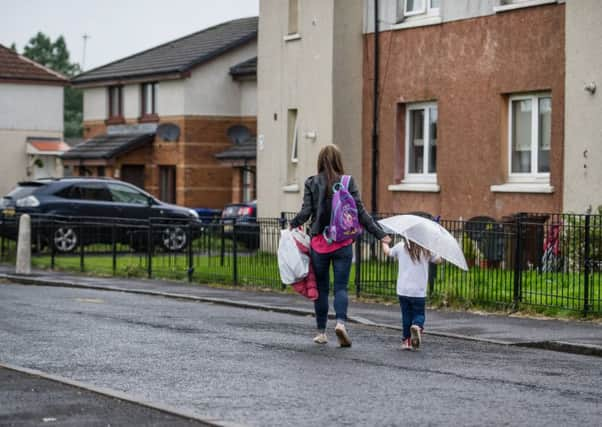Scotland's health inequalities '˜shame us all', say doctors


Significant health inequalities that persist between the richest and poorest parts of Scotland should “shame us as a society”, according to doctors.
BMA Scotland was responding to a report by the country’s chief statistician tracking key indicators of inequality over time.
Advertisement
Hide AdAdvertisement
Hide AdOfficial figures show the gap in healthy life expectancy between Scotland’s least deprived and most deprived communities of 26 years for men and 22.2 years for women.
While the gap in alcohol-related deaths is 28 per cent lower than its 2002 peak, it has been increasing since 2013 and is now 13 per cent higher than in 1997.
The report also looks at relative inequalities, or the difference between the most deprived areas and the Scottish average.
The gap in alcohol-related hospital admissions has remained the highest over the longer term, while relative inequalities in heart attack admissions have increased since 2008. The difference in cancer incidence has stayed relatively stable. Relative inequalities in coronary heart disease, cancer and premature mortality have all increased over the long term.
BMA Scotland Chairman Dr Peter Bennie said: “These latest statistics show that efforts to tackle health inequalities still have a long, long way to go.
“The gap in healthy life expectancy between our most and least deprived communities is stark and should shame us as a society.
“Far greater action is needed to address Scotland’s health inequalities. That means stronger public health measures to address issues like obesity and alcohol misuse, but it also requires action to address problems like low pay, poor educational outcomes and inadequate housing.
“We cannot keep letting more years pass without stronger action from every level of government to address these persistent inequalities.”
Advertisement
Hide AdAdvertisement
Hide AdThe report found that for a number of indicators, absolute inequality – or the difference between the most and least well off – has narrowed over the long term.
The gap in premature mortality rates for under-75s has reduced by 15 per cent from a peak in 2002. However, it has increased each year since 2013.
The difference in deaths from coronary heart disease has halved from its widest point in 1998, while the gap in alcohol-related hospital admissions had shrunk by 32 per cent since 1996.
Trisha Hatt, from Macmillan Cancer Support, said: “It’s disappointing to see that those in deprived areas are still so much more likely to die from cancer than those in the rest of Scotland. It’s especially worrying to see this relative survival gap is higher now than in 1996.
“Tackling health inequalities is a central aim of the Scottish Government’s cancer plan and this report shows it’s more vital than ever that the plan’s promises are delivered.”
Labour’s inequality spokeswoman Elaine Smith said the figures were “deeply concerning” and revealed a “postcode lottery”.
She said: “Poverty and inequality has a huge impact on your life chances, quality of life and ultimately life expectancy. We need to see radical action to address the health inequalities between the richest and the poorest in Scotland.”
The report found the gap in the percentage of babies born with low birth weight has reduced by 30 per cent since a high in 2004.
Advertisement
Hide AdAdvertisement
Hide AdPublic health minister Aileen Campbell said: “It is clear that deeply ingrained health inequalities persist in Scotland and reducing the gap between those in our most and least deprived areas is a significant challenge, but one we are working across government to rise to.
“At its root this is an issue of social and economic inequality and we need a shift in emphasis from dealing with the consequences to tackling the causes.
“We are taking concrete action to tackle poverty and inequality – from mitigating the worst impacts of the UK government’s austerity and welfare cuts, setting statutory targets to reduce and ultimately eradicate child poverty, and investing in our social commitments like free school meals and expanded childcare.”
Shadow health secretary Miles Briggs MSP said: “This report confirms that many of the long-term health inequalities, which are so stark in Scotland and have been so for many decades now, are continuing to persist.
“While some indicators are moving in the right direction, it is really alarming that some key statistics are now starting to move backwards again under this SNP government’s watch, not least premature mortality numbers and alcohol related deaths.” Alison Douglas, chief executive of Alcohol Focus Scotland, said: “Alcohol problems affect people from all backgrounds, but people living in our most deprived areas suffer far greater harm than those living in our least deprived areas. There are a wide range of social and economic factors that compound this harm.
“Sadly, these latest figures show that these inequalities are getting wider. Minimum unit pricing will go some way to narrowing this inequality gap. Those living in our poorest communities suffer the effects of cheap, high strength alcohol the most.”